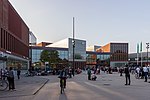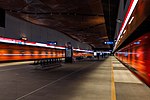Villa Elfvik
Buildings and structures in EspooEducation in UusimaaEnvironment of FinlandFinnish building and structure stubsNature centers ... and 1 more
Tourist attractions in Uusimaa

The Villa Elfvik nature house is an environmental education centre in Espoo, Finland, directed at all residents of Espoo. The nature house offers information about nature and the environment in all forms. Jugend style Villa Elfvik was designed by the architect Mauritz Gripenberg. The construction project finished in 1904. The villa was built to be a home for baroness Elvira Standertskjöld.Villa Elfvik is located in Laajalahti near the seashore, between the commercial centres of Tapiola and Leppävaara.
Excerpt from the Wikipedia article Villa Elfvik (License: CC BY-SA 3.0, Authors, Images).Villa Elfvik
Elfvikintie, Espoo Laajalahti (Suur-Tapiola)
Geographical coordinates (GPS) Address Nearby Places Show on map
Geographical coordinates (GPS)
| Latitude | Longitude |
|---|---|
| N 60.201944444444 ° | E 24.8225 ° |
Address
Villa Elfvik
Elfvikintie
02600 Espoo, Laajalahti (Suur-Tapiola)
Finland
Open on Google Maps









